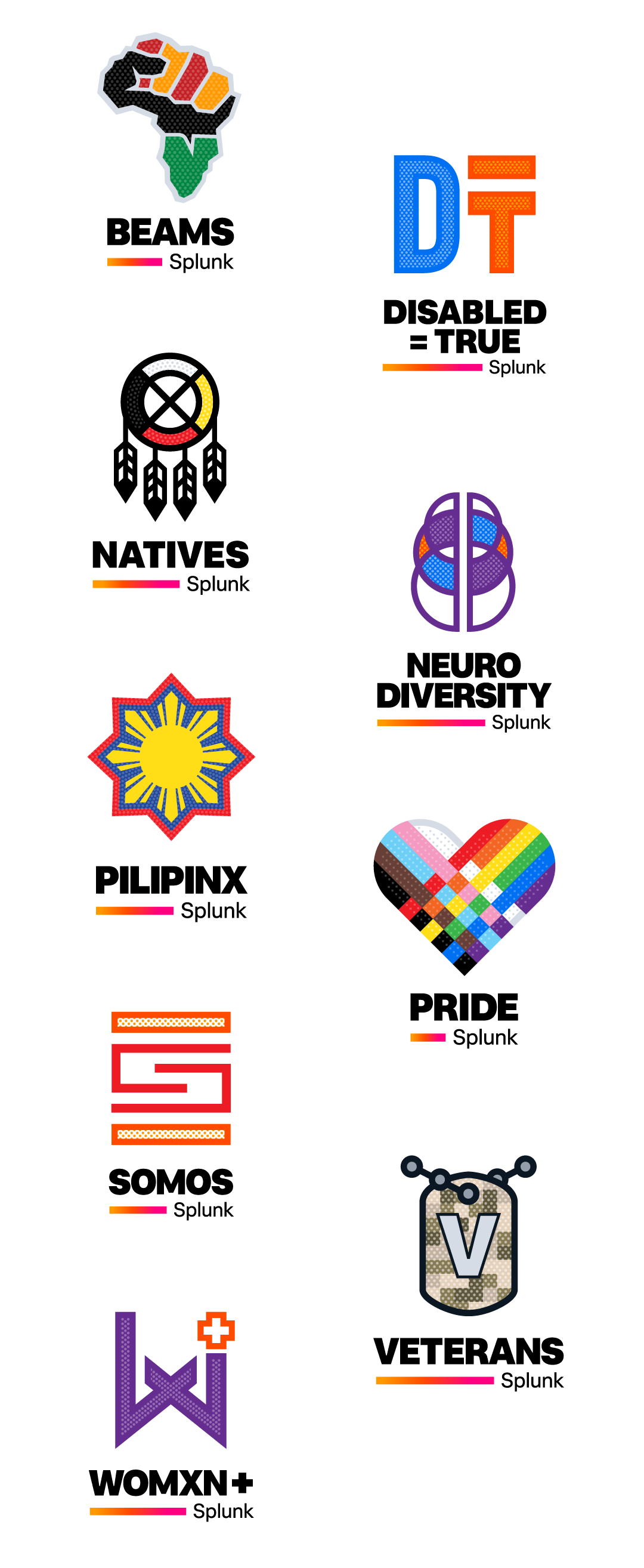
Introduction
Building for the Future
2022 was a transformative year for Splunk, marked by the continued growth of our business and the ongoing investments in building and enabling our hybrid workplace. And we doubled down on centering Splunkers in our employee experience efforts with enhancements to our mental and physical wellbeing benefits, new opportunities for career development and internal mobility, and the introduction of new opportunities to share context, build connection and grow community across our global and distributed workforce.
Similarly, we made meaningful investments to grow our Diversity, Equity, and Inclusion (DEI) capability, building on Splunk’s rich DEI legacy while laying the groundwork for a new vision for the future of DEI at Splunk with belonging at its center. We hired a new Chief Diversity Officer in January 2022, expanded our function and focus from DEI to DEIB – Diversity, Equity, Inclusion and Belonging –and developed the strategy, structures and systems necessary to enable the scaled and sustainable growth of DEIB at Splunk worldwide.
Throughout this period of transformation and growth, we maintained our focus on growing representation, elevating and celebrating the rich diversity of our people, and strengthening Splunk’s unique and inclusive culture so that all Splunkers are able to be themselves, do their best work and thrive.
We are pleased to present our fourth Diversity Annual Report, which outlines our progress over FY23 and identifies opportunities for continued investment and growth. While we are proud of our progress, we know our work is far from done and there are still areas where we can improve and grow. We recognize DEIB is a multi-year journey and laying a solid foundation is essential to building enduring growth and a lasting culture of belonging for all Splunkers. To that end, we remain firmly committed to building the people, systems and enterprise capabilities needed to accelerate our progress and achieve our DEIB ambitions.
OUR PEOPLE
As a global company with 25+ offices worldwide, Splunk is committed to building and sustaining a workforce that reflects the rich diversity of our communities. More than a theoretical aspiration, growing the diversity of our workforce is paramount to our vision for belonging and delivering an iconic and beloved employee and customer experience at Splunk worldwide. While we have made steady representation gains in some areas, we have observed declines in others. Mixed progress is not the bar of excellence we aspire to and, by that standard, we know there is more for us to do. We remain deeply focused on increasing the representation of women and underrepresented groups, especially in leadership and technical roles, and will build and grow the systems and leadership capabilities needed to accelerate and sustain our growth into the future.
In 2022, we continued to leverage the benefits of our hybrid workplace to grow representation and enrich our employee experience. Our workplace flexibility has expanded our access to new talent while also strengthening employee engagement and retention across the enterprise. We also invested in employee growth and development, helping Splunkers feel more connected and enabling them with new tools and resources to manage and grow their careers. These efforts have partly contributed to representation gains in several areas — especially among women. The percentage of Splunkers identifying as women (globally) increased in all job categories, including leadership, people managers, technical and non-technical roles, and overall representation.
In the U.S., the representation of employees identifying as Black/African American also grew in leadership, people managers, technical and non-technical roles, and overall representation.
Despite growing Asian representation in our U.S. people manager roles in 2022, we experienced a decline in Asian representation in leadership, technical and non-technical roles, and overall representation. And our Hispanic/Latinx representation also experienced a year-over-year decline in leadership, people managers, non-technical roles and overall representation.
We are continuing to make progress in growing representation across multiple intersecting identity groups. This includes year-over-year representation gains for Black and multiracial men/women and indigenous women in leadership roles. In addition, the representation of Black and multiracial women grew on a year-over-year basis in technical roles, people manager roles and in the overall workforce. However, we observed an overall decrease in the representation of Latinx and multiracial men.
We are pleased to report year-over-year gains in our overall hiring of Latinx women and Black/African American women and men. We are encouraged by the continued growth in our hiring of Black/African American women and multiracial women in leadership, people manager and technical roles. However, we experienced declines in our hiring of Latinx men, most notably in leadership roles, as well as Indigenous women and multiracial men across all categories (leadership, people managers, technical and non-technical roles, and overall). We recognize that our mixed progress in this space falls short of our ambitions. We remain deeply committed to increasing representation across all historically underrepresented groups, especially in leadership, and recognize the critical role of hiring in achieving our overall representation aspirations. To that end, we are continuing to build our systems and process capabilities across our talent practices to enable continued and sustained representation growth into the future.
Recruitment remains an important lever to growing the diversity of our workforce. In 2022, we grew our hiring of employees identifying as women into leadership, technical and people manager roles, contributing to an increase in their overall representation. We observed an increase in multiracial employees in people manager roles, and an overall increase in Black/African American employees hired across all categories (leadership roles, people manager roles, technical roles and non-technical roles, and overall). However, we observed a year-over-year decline in our overall hiring of Latinx and multiracial employees.
We’re encouraged to have seen continued year-over-year improvement in the overall retention of women at Splunk. At the same time, we intend to place a prioritized focus on growing the retention of our Latinx, Black/African American and multiracial employees.
Our annual EEO-1 Report is available for download, representing employees as of January 31, 2022.
- This report contains Splunk’s own data — including, but not limited to, gender, ethnicity and race — that allows us to determine our progress and identify areas of continued focus. In this report, we cover our fiscal year of Feb. 1, 2022 through Jan. 31, 2023. Figures are based on self-identification data only, and we’ve rounded each data label to the nearest tenth of a point. Gender data is from Splunk employees around the world (0.4% of employees globally have declined to disclose their gender). Race and ethnicity data applies to U.S.-based employees only (13.1% of employees in the U.S. have declined to disclose their race/ethnicity). If employees who chose not to disclose their demographic information elect to do so in the future, this will change our historical representation figures.
- Underrepresented groups in the U.S. technology industry are defined as Black/African American, Latinx/Hispanic, Indigenous (Native American, Hawaiian or Pacific Islander), and multiracial people (two or more races). Race/ethnicity data refers to the EEO-1 race/ethnicity categories established by the U.S. government.
- Note: Totals may not add to 100% due to rounding.
- Multiracial employees are those who identify as two or more races.
- Technical roles include engineering, design, product, QA, data analytics, information technology and some consulting roles.
- Non-technical is defined as all employees whose roles are not considered technical.
- People managers are defined as employees who have at least one full-time direct report.
- Leadership roles for purposes of this report are defined as director-level or above, in line with industry definitions. When we report on leadership trends in this report, we’re comparing director and above, year-over-year.
- To evaluate retention, we compared the retention rate of each group to the company average and set the average to an index of 100.
OUR CULTURE
Investing in our people, celebrating our Million Data Points culture, and building an iconic and beloved employee experience has always been at the heart of Splunk’s unique workplace culture. Central to that effort has been our emphasis on growing the diversity of our workforce and ensuring that our culture is one in which Splunkers of all identities and backgrounds are able to be themselves so that they can do their best work and thrive. In 2022, we continued to build on this legacy, growing our capabilities and laying the groundwork for a new multi-year vision for belonging at Splunk.
We are immensely proud of our employee resource groups (ERGs) and the exemplary work these employee-led groups continue to lead in service to building a better, more inclusive Splunk for all employees. In addition to growing awareness and allyship across all identity groups, our ERGs continue to support Splunkers from underrepresented and marginalized communities by being a source of connection, supporting career development and nurturing opportunities for advocacy and community engagement. Here are just a few highlights of their achievements in 2022:
ERGs
- Our Black Employees Achieve More at Splunk (BEAMS) ERG led impactful Black History Month programming which included a LinkedIn Live panel, “The Black Ceiling,” focused on the evolution of workplace discrimination and how it’s impacted the Black community when it comes to entrepreneurship and landing a seat at the executive table.
- Splunk’s Disability ERG hosted a fireside chat with Catarina Rivera, disability advocate and founder of Blindish Latina, to discuss how to support people with disabilities in the workplace, and the importance of allyship and understanding the nuances of intersectionality.
- During Native American Heritage Month in October, our Natives ERG brought in two guest speakers – Winona LaDuke (author, economist and executive director of Honor the Earth) and Tara Houska (tribal attorney, TED speaker and climate justice advocate) to discuss ways Splunkers can honor and protect our land.
- In partnership with Uptimize, our Neurodiversity ERG implemented a company-wide Neurodiversity 101 training, both live and self-paced, to help sustain a more neuro-inclusive workplace.
- Our Pilipinx ERG celebrated Filipino American History Month with a donation to the P.U.S.O. Foundation and an educational lesson on the art of Eskrima and other forms of Filipino Martial Arts commonly seen in action movies.
- In recognition of Transgender Awareness week, our Pride ERG brought the GenderCool Project to Splunk to grow awareness, advocacy and action in service to transgender youth.
- In partnership with Latinas in Tech, our Somos ERG presented a panel titled “¡Sí, tu puedes! A bright Future in Big Data with Splunk,” discussing how to recognize transferable skills to break into the technology field.
- In honor of Veterans Day in the U.S., our Veterans ERG spoke with Tee Marie Hanible and discussed ways to create inclusive workplaces for veterans re-entering the workforce, and how to be better allies to veterans globally.
- Our Womxn+ ERG sponsored a data-driven education session about the legislative history in regard to reproductive rights in the U.S., led by Dr. Loretta Ross.


As part of our broader efforts to grow DEIB at Splunk, we continued our focus on optimizing our systems and processes to enable scaled and sustainable DEIB outcomes. From our people practices to our products and customer experiences, here are just a few of the ways we built equity and inclusion into our services and solutions in 2022:
- Revamped Inclusive Hiring Practices: We introduced a new Splunk Certified Interviewer Course to support our hiring managers and interviewers in conducting high-quality interviews as part of our commitment to fair, equitable, accurate and reliable hiring decisions. Over 400 employees have participated in the hiring certification program to date, with another 300 in our current cohort.
- Measured Belonging Sentiment: Each Splunker perceives belonging differently, depending on their individual experience. Using our bi-annual employee survey, we‘re using a data-driven approach to measure, monitor and improve Splunker satisfaction with our DEIB intent, programming and outcomes. DEIB continues to be a driver of employee engagement across the company, consistently ranking among the top factors of overall employee engagement at all of Splunk.
- Inclusive Products: As a part of a multi-year initiative, we continued the work of optimizing our products for inclusion by removing biased and harmful terms from our products and documentation, and launched an ongoing program to reevaluate and prevent biased language from appearing on our platform.
- Supported Career Mentorship Programs: Through CaMP, our career mentorship program that brings together rising talent within Splunk with mentors, we ran four cohorts in 2022 with almost 900 mentees.
- Empowered Employee Giving: Splunkers receive five paid days of volunteer time off (VTO) annually, and up to $500 in matching donations to any nonprofit of their choice. Through our Global Giving Challenge in 2022, Splunk and Splunkers donated more than $1.5 million to over 3,900 causes globally and Splunkers volunteered a total of 18,745 hours. By donating time and money, Splunkers are driving a positive impact on their communities and society at large.
- Recognized as a Great Place to Work: While we know there is still more to be done, we are proud of the external recognition we’ve received. In 2022, we received numerous prestigious industry awards, including the 2022 HRC Corporate Equality Index: Best Places to Work for LGBTQ (with a perfect score of 100 for the second year in a row), and were recognized by Great Place to Work on their Best Workplaces for Women, Parents, Millennials and in Technology lists. Click here to view the complete list.
OUR COMMUNITY PARTNERSHIPS
In the midst of a post-pandemic world that continues to reveal systemic social and economic inequities, we launched several initiatives that focused on advancing fairness, equity and inclusion in our communities and across our industry. Here are some of the partnerships we fostered during 2022:
- Scholarships: Through our Splunk HBCU Academic Scholarship, we partnered with three prestigious historically Black colleges and universities (HBCU) — North Carolina A&T University, Florida A&M University, and Tuskegee University — to support the scholarship recipients' education in STEM-related degrees. In 2022, Splunk awarded 12 scholarships with plans for continued growth.
- Strategic Partnerships: We continued to close the opportunity gap by expanding access to jobs in the technology industry for underserved and underrepresented communities. We partner with close to 20 workforce development nonprofits to help achieve this goal, including Year Up, Hire Military, The Mom Project, Per Scholas, and WithYouWithMe. Additionally, our BEAMS ERG partnered with the Hidden Genius Project and Brothers Code to bridge the opportunity gap and increase access to tech for young Black men and youth of color.
- Strategic Investments: Through Splunk Ventures, we continued to support startups that use innovative, data-driven solutions to solve humanity's biggest problems. As an example, our portfolio company retrain.ai, is a leading talent intelligence platform dedicated to up-skilling the workforce and removing bias from hiring practices with responsible AI. retrain.ai’s unique solution led to its selection as a Global Innovator by the World Economic Forum. Another example is Aclima, a climate tech leader in hyperlocal air quality and greenhouse gas mapping and analysis. In 2022, they released groundbreaking data insights from block-by-block mapping across the San Francisco Bay Area that highlighted the economic and racial disparities related to air pollution — and created a new tool that empowers decision-makers to take data-informed action.
- Strategic Giving: We provided Social Justice and Equity grants to support both national and global nonprofits that address inequalities. Our 2022 grantees included ProPublica, Code2040, International Rescue Committee, and the Global Fund for Women.
- Supplier Diversity: We’re intentional about empowering small businesses and businesses owned by women and underrepresented groups. We set a diverse supplier spend target of 3% of Splunk’s total procurement spend in 2022. We’re proud to report that we exceeded that goal, achieving a total of 5%.


OUR COMMITMENT
Building Belonging for a Better, Stronger Splunk for All
Throughout the history of Splunk, and against a backdrop of rapid growth and change, the secret to our success continues to be the rich diversity of our people and our unique, innovative and inclusive workplace culture. As we look to the future, we remain steadfast in our commitment to growing the representation of our workforce at all levels, especially in leadership, and to advance a culture of belonging where every Splunker can be themselves, do their best work and thrive.
While this commitment is not new, how we deliver on it must evolve to meet the changing needs of our workforce and the new nature of how and where work gets done in a hybrid environment. It requires greater intentionality, deeper systems integration, and an ability to reach further to build community and belonging across our physical and digital workspaces. To that end, we move forward with purpose and intentionality on our path to belonging - encouraged by our progress and inspired by our deeply held belief that a more diverse, inclusive and equitable Splunk is a better, stronger Splunk for all.


